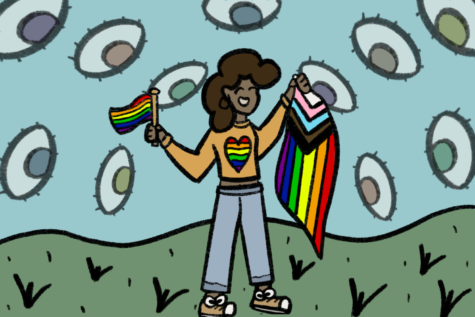OPINION | Addressing Tulane’s institutionalized homophobia
November 10, 2021

Using gay as an insult. Sexualizing queer identities. Begging for a “gay best friend.” These are examples of what is known as casual homophobia, which is defined as “slurs that aren’t always meant to be harmful, but are often used without thinking of the consequences.” Casual homophobia is not just the usage of slurs, but any form of homophobia whose impact and harm to queer people is not initially considered.
Casual homophobia is an exceptionally large problem at Tulane University and United States universities in general, and has a much more deep-rooted history than one might think. Experiencing small instances of homophobia like these are not isolated issues. Rather, they are connected issues of an institutionalized homophobia problem in universities, rooted in anti-queer, heteronormative ideology.
In a survey sent to queer college students, respondents answered questions regarding their experiences with homophobia in college. Of the 30 respondents, 72.4% said that they felt safe to be outwardly queer on campus, but 86.2% responded that they have experienced casual homophobia on their campus.
Research on homophobia reveals that just under 99% of students between the ages of 13 and 21 have heard negative comments about being part of the LGBTQ+ community. So, what does this mean for the queer community, and what negative experiences impact queer Tulane students?
According to the survey, respondents reported numerous examples of casual homophobia experienced and witnessed by Tulane students. One respondent said that primarily male- presenting people gawk at or flirt with female-presenting people who kiss in public or on campus. Another respondent said they heard a Tulane student say that gay men do not count as men.
Numerous respondents described that queer students have been called slurs, been blatantly misgendered and that there is a looming sense of unsafeness when queer couples practice public displays of affection, something heterosexual couples do safely.
Respondents also expressed that queer couples, primarily female-presenting couples, are constantly sexualized by Tulane students. Students use “gay” as an insult, and slurs are commonly heard, especially in night life.
Why are queer Tulanians experiencing discrimination if Tulane is attempting to address homophobia on campus? It is because institutions are only looking at the symptoms of a greater problem instead of the problem itself, which is institutionalized homophobia.
Institutionalized homophobia is defined as “The collective failure of an organization to provide an appropriate and professional service to people because of their sexuality. It can be detected in processes, attitudes and behavior which amount to discrimination through unwitting prejudice, ignorance, thoughtlessness and stereotyping.”
With this definition in mind, universities need to recognize that the examples described above are all symptoms of a larger and deeper structural problem of homophobia in the United States. Universities need to combat discrimination with the notion that homophobia is ingrained in American society.
Students and universities alike need to organize queer education, training and resources in ways that acknowledge the part educational institutions play in institutionalized homophobia. For example, Tulane needs to include comprehensive education in its diversity and inclusion curriculum that teaches the history of homophobia and how it is ingrained in the institutions of the U.S.
Outside of the classroom, Tulane must also address how seemingly small instances of casual homophobia reinforce and reingrain homophobia in educational institutions. With this recognition and work comes the dismantlement of the systems that enforce oppression and institutional homophobia on queer students.
In order to help queer students and faculty members feel empowered and safe, students and the university need to continue ensuring the well-being of and providing resources to queer Tulanians.
To some students, this means being surrounded by queer friends, adults, professors, upperclassmen and mentors to show them that being queer is not something you need to do alone. For others, it is about having queer-affirming spaces, organizations and relationships that are easily accessible.
Dismantling institutionalized homophobia can also be about having public statements that acknowledge queer students and give them a place to feel heard. Finally, working to celebrate queerness can be about incorporating gender, sexuality and queer studies into disciplines and learning spaces so that the spectrum of identities is better understood and normalized.
Tulane has fulfilled most of these measures and has taken steps to make the queer community feel welcome. The university has a wonderful Queer Student Alliance and many other gender- sexuality-related clubs — there are centers and initiatives centered around diversity and inclusion for staff, faculty and students, and there are courses focused on gender and sexuality relations.
Despite these efforts, the Tulane community must still look closer into what is causing these problems and look at the deep history of homophobia that is constantly reinforced through human interactions. With this work, we are better able to dismantle the systems that enforce oppression on queer students and make Tulane’s queer community feel that Tulane is doing the most to combat homophobia in a tiringly anti-queer world.









skeel Chadeel • Dec 5, 2021 at 10:24 am
“Never make fun of the alphabet people”-Dave Chapelle
Alum • Nov 18, 2021 at 10:33 am
Really missed the chance to spell it ‘Heauxmeauxpheauxbia’